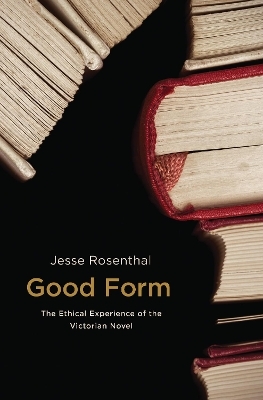
Good Form
The Ethical Experience of the Victorian Novel
Seiten
2016
Princeton University Press (Verlag)
978-0-691-17170-8 (ISBN)
Princeton University Press (Verlag)
978-0-691-17170-8 (ISBN)
What do we mean when we say that a novel's conclusion "feels right"? How did feeling, form, and the sense of right and wrong get mixed up, during the nineteenth century, in the experience of reading a novel? Good Form argues that Victorian readers associated the feeling of narrative form--of being pulled forward to a satisfying conclusion--with inner moral experience. Reclaiming the work of a generation of Victorian "intuitionist" philosophers who insisted that true morality consisted in being able to feel or intuit the morally good, Jesse Rosenthal shows that when Victorians discussed the moral dimensions of reading novels, they were also subtly discussing the genre's formal properties. For most, Victorian moralizing is one of the period's least attractive and interesting qualities. But Good Form argues that the moral interpretation of novel experience was essential in the development of the novel form--and that this moral approach is still a fundamental, if unrecognized, part of how we understand novels.
Bringing together ideas from philosophy, literary history, and narrative theory, Rosenthal shows that we cannot understand the formal principles of the novel that we have inherited from the nineteenth century without also understanding the moral principles that have come with them. Good Form helps us to understand the way Victorians read, but it also helps us to understand the way we read now.
Bringing together ideas from philosophy, literary history, and narrative theory, Rosenthal shows that we cannot understand the formal principles of the novel that we have inherited from the nineteenth century without also understanding the moral principles that have come with them. Good Form helps us to understand the way Victorians read, but it also helps us to understand the way we read now.
Jesse Rosenthal is assistant professor of English at Johns Hopkins University.
Acknowledgments xi Introduction "Moralised Fables" 1 1 What Feels Right: Ethics, Intuition, and the Experience of Narrative 10 2 The Subject of the Newgate Novel: Crime, Interest, What Novels Are About 42 3 Getting David Copperfield: Humor, Sensus Communis, and Moral Agreement 78 4 Back in Time: The Bildungsroman and the Source of Moral Agency 124 5 The Large Novel and the Law of Large Numbers: Daniel Deronda and the Counterintuitive 153 Afterword 191 Notes 197 Bibliography 235 Index 251
| Erscheinungsdatum | 08.12.2016 |
|---|---|
| Zusatzinfo | 1 halftone. |
| Verlagsort | New Jersey |
| Sprache | englisch |
| Maße | 152 x 235 mm |
| Gewicht | 567 g |
| Themenwelt | Geisteswissenschaften ► Sprach- / Literaturwissenschaft ► Anglistik / Amerikanistik |
| Geisteswissenschaften ► Sprach- / Literaturwissenschaft ► Literaturgeschichte | |
| Geisteswissenschaften ► Sprach- / Literaturwissenschaft ► Literaturwissenschaft | |
| ISBN-10 | 0-691-17170-X / 069117170X |
| ISBN-13 | 978-0-691-17170-8 / 9780691171708 |
| Zustand | Neuware |
| Haben Sie eine Frage zum Produkt? |
Mehr entdecken
aus dem Bereich
aus dem Bereich
Poetik eines sozialen Urteils
Buch | Hardcover (2023)
De Gruyter (Verlag)
59,95 €
Entzauberung und Faszination des Immergleichen in Literatur und Film
Buch | Softcover (2024)
Springer Fachmedien Wiesbaden GmbH (Verlag)
84,99 €
Buch | Softcover (2024)
belleville (Verlag)
20,00 €


